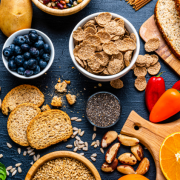Probiotics, Prebiotics, and Postbiotics: What Are They and Why Are They Important?

Key Takeaways:
- Probiotic and prebiotic supplements lack substantial scientific evidence that they promote microbiome health.
- Rather than taking supplements, experts recommend eating fermented foods (probiotics) to promote microbiome diversity and fibrous foods (prebiotics) to feed and sustain “good” bacteria in the gut.
- Recommended fermented foods (probiotics):
- Fermented vegetables: kimchi, sauerkraut, and certain pickled vegetables
- Fermented dairy: yogurt, cottage cheese, kefir, and certain cheeses
- Fermented soy: tempeh and miso
- Recommended high-fiber foods (prebiotics):
- Legumes: lentils, chickpeas, black beans, and kidney beans
- Seeds: chia seeds, flaxseeds, pumpkin seeds, and sunflower seeds
- Whole grains: quinoa, brown rice, oats, and barley
- Nuts: almonds, walnuts, pistachios, and pecans
- Vegetables: broccoli, Brussels sprouts, artichokes, carrots, and sweet potatoes
- Fruits: apples, pears, berries (raspberries, blueberries, strawberries), and bananas
- Postbiotics, the byproduct of probiotic and prebiotic activity, not only reduce the risk of chronic diseases and support brain health, but also offer anti-inflammatory and beneficial metabolic effects.
Within our bodies, there exists a bustling community that often goes unnoticed but plays a pivotal role in our well-being—the microbiome. Understanding the impact of the microbiome on our health is not just a scientific curiosity, it’s a crucial aspect of our health that underscores our body’s complex equilibrium. Through continuous negotiations, our body and microbiome engage in a symbiotic relationship—a dynamic exchange where we provide our microbiome with nourishment and “good” inhabitants, and in return, it synthesizes beneficial compounds to support our health.
“We are, in essence, walking ecosystems. Our health is intimately connected to the trillions of bacteria, viruses, and fungi that make up this community,” says Sean Spencer, MD, PhD, Gastroenterologist and Physician Scientist at Stanford University.
The microbiome actively participates in various bodily functions, from aiding digestion and nutrient absorption to eliminating toxins and synthesizing vitamins and amino acids.
“The influence of our microbiome extends far beyond the confines of the digestive system, reaching major body systems like the immune system, metabolism, and the central nervous system,” states Rachele Pojednic, PhD, Stanford University nutrition and exercise scientist.
While the definition of a healthy microbiome remains unclear, the majority of studies find that high microbiome diversity is linked to better health outcomes. “A healthy microbiome is one that is equipped to process a diverse array of dietary fiber to produce health-promoting compounds for our body,” states Dr. Spencer. “Low microbiome diversity is linked to various health conditions, including diabetes and obesity and likely has reduced fiber-degrading potential and lower production of health promoting compounds.”
A recent study revealed that the average Californian has a microbiome that contains 277 microbial species, a stark contrast to the average of 730 found in non-industrialized populations. This finding aligns with a mounting body of evidence suggesting that modern lifestyles and Westernized diets have significantly depleted the essential diversity of our gut microbiome.
Therefore, many individuals have sought ways to manipulate their microbiome and increase its diversity via supplementation. Commonly referred to as probiotics and prebiotics, these supplements have surged in popularity, achieving sales of $35 billion in 2015 and projected to reach $65 billion by the end of 2024.
Despite their widespread use, there is significant confusion about what they are, where to find the best ones, and what they can and can’t do. Regardless, experts say the most powerful and beneficial sources for all your biotic needs are often overlooked (hint: they are in your refrigerator).
What Are Probiotics and Why are They Important?
Probiotics are live microorganisms that are consumed for health benefits and typically found in fermented foods like yogurt, kimchi, and sauerkraut. They play a crucial role in supporting our gut by introducing beneficial bacteria to our microbiome community. Simultaneously, they reduce the proliferation of harmful bacteria by constraining their available space for growth.
Upon hearing the term “probiotics,” many individuals associate it with the supplement pills that have long been advertised to improve digestive health. However, these supplements are not recommended over food, as they can displace favorable microbial residents in the gut.
“The doses of microbes found in supplements are overly potent, with billions to trillions of microbes, far exceeding the amounts in fermented foods, which contain hundreds of thousands to millions,” states Dr. Pojednic. “In this context, more is not better; natural sources provide a gentler, more physiologically effective way to support your microbiome.”
Another problem with probiotic supplements is they are created under the assumptions that the same bacteria strains are beneficial to everyone. But research indicates that microbiota composition and function varies significantly among individuals. What benefits one person may not necessarily work for another, and the scientific community is yet to develop the means to tailor probiotic prescriptions on an individual basis. Moreover, most beneficial gut bacteria that promote health are not yet available in probiotic supplement form.
“While healthy microbiomes may display certain shared characteristics, such as diversity, the specific types of bacteria that truly confer benefits remain unclear. Therefore, the limited selection of bacterial strains found in probiotic supplements may not be what your gut needs,” states Dr. Spencer.
Rather than taking probiotic supplements, Spencer and Pojednic recommend increasing the intake of probiotics by consuming fermented foods. Furthermore, fermented foods contain metabolic byproducts and other signaling molecules that probiotic supplements alone do not. Growing evidence suggests these metabolites confer additional health benefits and may aid the colonization of beneficial bacteria in our gut.
Fermented foods have been associated with enhancing microbiome diversity and overall health in several studies. A notable study was conducted at Stanford University, where participants adhered to a diet rich in fermented foods. Following a ten-week regimen of daily intake of five servings of fermented foods, participants demonstrated increased microbiota diversity and a notable reduction in inflammation in the body.
Dr. Spencer highlights this intriguing correlation, stating, “As the diversity of participants’ gut microbiome increased, there was a simultaneous decrease in various markers of inflammation, emphasizing the beneficial impact of fermented foods on overall health.”
“It’s important to remember that not all fermented foods have probiotic properties. When identifying probiotic foods, look on the labels for terms like ‘live cultures’ or ‘active cultures.’ Additionally, look for foods in the refrigerated section of the grocery store,” states Dr. Pojednic.
Should I Take Probiotics After Antibiotics?
A popular strategy to mitigate the depletion of one’s microbiota following antibiotics is to take probiotic supplements. However, a study revealed that probiotic supplements could unintentionally impede the normal recovery of the microbiota by displacing beneficial microbes in the gut. Participants who received the probiotic supplement took more than five months for their microbiome to recover, in contrast to those who received a placebo, whose microbiome returned to normal within three weeks. These findings suggest that taking probiotic supplements after antibiotic treatment did not help balance the microbiome; in fact, these supplements impaired its recovery.
“When this trial came out a few years ago, it created a paradigm shift in the field by showing that taking probiotics after antibiotics may actually delay the recovery of your microbiome,” states Dr. Spencer. “Now, I spend a lot of my time in GI clinics convincing people not to take probiotic supplements after antibiotics.”
While probiotic supplements are often used to alleviate symptoms linked to gastrointestinal conditions, such as irritable bowel syndrome and diarrhea, the American Gastroenterological Association does not recommend probiotics for the treatment of any adult gastrointestinal conditions outside of pouchitis. In any case, it’s advisable to consult with a physician before incorporating a probiotic supplement into one’s routine.
“As of now, there are very few probiotic supplements that have strong evidence of their beneficial effect in treating gastrointestinal disease,” states Dr. Spencer. “Nevertheless, this landscape is evolving quickly with ongoing research and advancements in probiotics. I’m hopeful that the next generation of probiotics will target GI disease more effectively.”
What Are Prebiotics and Why are They Important?
After establishing a diverse and healthy microbiome (by consuming a variety of probiotic foods), it becomes crucial to actively sustain it. What you eat directly fuels your microbiome community and determines which microbes will flourish and which will parish in the competitive landscape of your gut.
Prebiotics are nutrients that foster the growth and proliferation of beneficial bacteria in the gut, ultimately contributing to overall gut health. The main prebiotics our microbiome thrives on are known as microbiota-accessible carbohydrates (MACs), commonly referred to as dietary fiber. These complex carbohydrates, found in fruits, vegetables, whole grains, legumes, and other plant materials, resist our body’s degradation and absorption processes. This digestive resistance allows them to reach the colon still intact, providing a feast for our gut bacteria.
For individuals consuming diets high in sugar, fat, and protein, but lacking in dietary fiber, these macronutrients will break down and enter the bloodstream before reaching our colons. As a result, the typically diverse microbial community found in our colons will starve. Over time, the microbiome, in its quest for sustenance, may resort to consuming the gut’s protective mucus layer. This degradation can lead to a cascade of adverse effects, including inflammation within the gastrointestinal tract.
“Without the nourishment provided by fiber, the microbiome is left to fend for itself, potentially resulting in detrimental consequences for both its composition and the overall health of the gut,” states Dr. Spencer. “Eating prebiotic-containing foods is critical to sustain a healthy microbiome.”
In recent years, prebiotic supplements have gained popularity, however, our experts advise opting for fibrous foods over supplements to meet your microbiome’s probiotic requirements. This preference is rooted in the fact that foods offer a diverse array of fiber types, whereas supplements commonly feature a single type. The consumption of a singular fiber type restricts the nutritional support available to our microbiome, and can limit overall diversity that is crucial for a healthy microbiome. Moreover, fiber-rich foods offer various nutritional health benefits not found in supplements. Dr. Spencer suggests that if occasional supplement use is preferred to meet prebiotic needs, choosing supplements with a mix of fiber types is advisable. Nevertheless, opting for fiber-rich foods proves to be a more dependable and cost-effective source.
While more research is needed to fully understand the microbiome and how probiotics and prebiotics work in harmony, it’s reasonable to infer that the presence of one may enhance the function of the others. To promote microbiome diversity and a healthy gut, it’s essential for one’s diet to be a balanced combination of fermented foods (probiotics) and dietary fiber (prebiotics).
“My favorite breakfast is yogurt (a probiotic food) topped with berries and whole-grain granola (which are prebiotic foods). In one delicious meal, I fulfill all my biotic needs,” states Dr. Pojednic.
What Are Postbiotics and Why are They Important?
While many have heard of probiotics and prebiotics, the term postbiotics is relatively new. Postbiotics are the byproduct of probiotic and prebiotic activity. Essentially, they are the waste products left behind by the breakdown of fiber by the bacteria in your microbiome.
These byproducts can be both beneficial and harmful to your health. The breakdown of fiber yields a treasure trove of beneficial postbiotics. Among these are essential elements such as vitamins, enzymes, amino acids, and short-chain fatty acids (SCFAs). One standout SCFA is butyrate, a superpower molecule throughout the body that plays a pivotal role in various aspects of health. Linked to a reduced risk of chronic diseases, butyrate also exhibits anti-inflammatory properties, supports brain health, and has beneficial metabolic effects.
Conversely, the breakdown of meat in the digestive process yields molecular byproducts such as choline and L-carnitine. In the microbiome, these compounds get broken down further into trimethylamine (TMA), which is subsequently absorbed by the circulatory system and oxidized in the liver to form trimethylamine N-oxide (TMAO). Elevated levels of TMAO have been associated with an increased risk of clot-related cardiovascular events. Intriguingly, a study conducted at Stanford suggests that refraining from meat consumption for eight weeks could potentially suppress the “bad” bacteria associated with TMA production when reintroducing meat into the diet, however, additional research is required to validate this hypothesis.
Postbiotic Supplements
While the concept of postbiotics is relatively new, the popularity of postbiotic supplements is on the rise. Butyrate supplements, for instance, are becoming increasingly common. It is essential to recognize that a deficiency in Butyrate might signify an underlying issue with one’s diet and digestive system, which a supplement alone may not rectify. The most effective strategy for boosting postbiotics involves embracing a diet rich in fermented food and fiber.
Take Home Message: Food is Better than Supplements
Compared to supplements, fermented and fibrous foods provide a diverse array of microorganisms that benefit your microbiome. Moreover, supplements miss out on the synergistic biotic combination of components found in whole meals. Research consistently underscores the pivotal role of diet in shaping the composition and function of a healthy gut microbiome, serving as the most comprehensive and research-backed biotic source.
“We have abundant data to demonstrate that food affects the microbiome. And while supplements certainly have their place–to address nutrient deficiencies and improve specific health outcomes–the evidence for the supplements widely marketed for benefiting the gut are limited at best,” states Dr. Pojednic. “To ensure your microbiome is getting the sustenance it needs, it is best to get your probiotics from fermented foods and prebiotics from high-fiber foods, which have the added bonus of numerous other health benefits.”
Another thing to consider is safety and efficacy of the supplements. Most supplements are loosely regulated by the FDA, meaning manufacturers don’t need to prove safety and efficacy. For this reason, it’s always better to get a nutrient or biotic source from food over supplementation unless it has been recommended by your physician or dietitian.
Most importantly, relying on biotic supplements cannot remedy the consequences of a poor diet. Long-term dietary habits play a pivotal role in the adaptability of the gut microbiome, with the consumption of diverse fermented and high-fiber foods being paramount. As our dietary habits evolve, so does the microbiome, adapting and diversifying to create a resilient and well-balanced ecosystem. In essence, the journey to a healthier gut extends beyond the allure of quick-fix supplements.
“While there is some regulation on manufacturing and marketing of supplements, enforcement is rare unless there is a well-documented negative health effect. Third party testing is key to ensuring you are consuming a safe product. Otherwise, you can fall prey to deceptive claims, mislabeled ingredients or possible contamination,” states Dr. Pojednic. “Safe, well studied supplements have their place, but we just aren’t there yet with these products.”
With ongoing advances in microbiome research, the future may hold more precise probiotic, prebiotic, and postbiotic interventions, potentially enhancing the effectiveness of supplements. However, the foundation of gut health remains deeply rooted in dietary habits, emphasizing the enduring value of natural, food-based approaches over supplementation.








